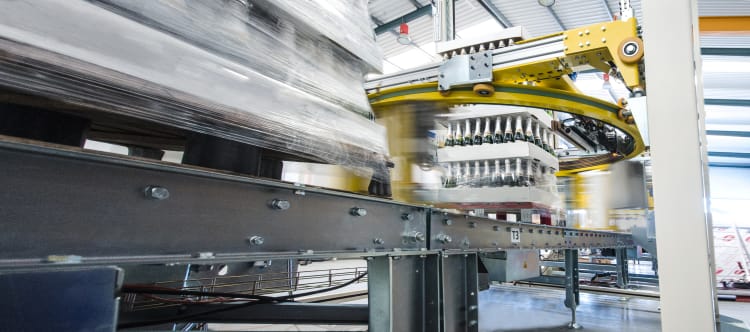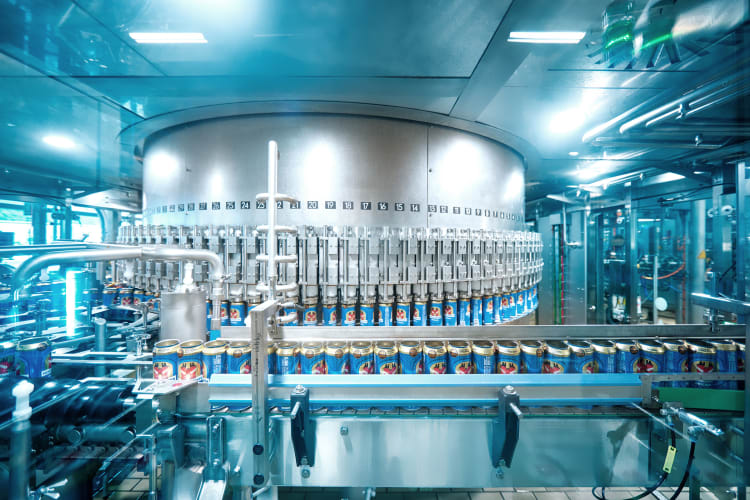Better safety on the road
In order for bottles, cans and beverage cartons to reach their point of sale without damage, they need proper safety measures during transportation. Usually, thin stretch wrap is used for stable packing on a pallet. For this purpose, machine manufacturers like interpack exhibitor Mosca offer strapping machines for pallets and stretch winders. Depending on the type of packaging, safety requirements for the pallet can be very different. Cans must be protected against warping, glass bottles against breaking. In order to transport lightweight, empty beverage cans, for example, they not only need to be held in place from the side or from the top, but also require light pressure to be kept secure on their way to the beverage bottlers. A new strapping machine for pallets by Mosca creates the necessary pressure on the empty cans through vertical strapping. The system uses sustainable PET straps made from recycled materials and packages/wraps up to 61 pallets per hour for transport, without wasting resources. As a narrow strip of plastic is enough to secure even the heaviest pallets, the use of material and the carbon footprint are kept to a minimum.

With the stretch winder Saturn S6 by Mosca, even fragile bottles can be transported to the supermarket with optimum safety. © Mosca
Alternative to plastic shrink wrap
Inside modern stretch winders, a reel of foil circles the pallet horizontally, while the goods - full cans or fragile bottles - remain static. Elastic stretch wrap is used very often, as pre-stretching the foil increases its stretchability up to 300 percent. Manufacturers are already working on a more sustainable solution using renewable material. For example, packaging a pallet with elastic, puncture-resistant paper is a packaging solution that can be fully recycled. For wrapping PET bottles, too, a paper-based solution that can be completely recycled has recently entered the market: a package band made from 100 percent kraft paper that wraps around bottles, has a high tensile strength and is able to support enough weight to secure the bottles during transport. The second part of this solution is a clamp made of corrugated cardboard that grips the bottle neck. Individual bottles can be easily separated from the package.
Hygiene is a priority
The beverage can still remains popular. While it used to be the case that cans were primarily filled with beers and carbonated drinks, for some time now there has been a trend towards canning more sensitive products like iced teas, plant-based drinks, juices, smoothies or near-water products. This development poses new hygienic challenges to beverage bottlers. The system manufacturer KHS reacted to this by developing the fill-and-seal block SmartCan together with the Swiss mechanical engineering company Ferrum, which represents the first time that their respective machines have been seamlessly joined and also features optimised hygienic measures. The hygienic space inside the filler part of the block consists of raised sheathing plates on one side, and an enclosure on the other side that has a notably smaller product space around the filler carousel: Following the so-called donut principle, this creates a ring-shaped enclosure, reduces the volume of the hygienic space by 40 percent and allows an optimised, targeted jet of sterile air to stream around the sensitive zone.

Filler and seamer part of the combined block solution SmartCan by KHS/Ferrum feature optimised hygienic properties. Copyright: Roth und Schmid Fotografie
Filling technology
Hygiene is also important for the new aseptic filling system developed by Sidel for the growing market for sensitive beverages in PET bottles. The integrated stretch-blow-fill-seal solution is a further development of Aseptic Combi Predis technology, intended to help bottling companies serve the growing market for drinks with a long shelf life, like for example juice, fruit beverages, soft drinks, isotonic drinks and tea, as well as liquid dairy products. The demand for these products, says Sidel, is expected to reach a volume of 192 billion units by 2024, which is an increase of 44 percent compared to 2011. Sensitive products are said to represent 55 percent of the market for non-alcoholic beverages, and the predicted growth of this segment (annual growth rate of 2.3 percent from 2019 to 2025) is higher for PET bottles than for other materials.


